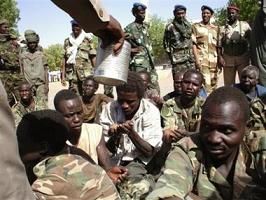Tension between Chad and Sudan mounts
April 15, 2006 (N’DJAMENA) — Tension between Chad and Sudan rose further following a rebel attack that observers say could yet lead to the fall of Chadian President Idriss Deby Itno and plunge the country into chaos.
 Sudan said Chad had ordered its top diplomat in N’Djamena to leave the country, after breaking off diplomatic ties on Friday.
Sudan said Chad had ordered its top diplomat in N’Djamena to leave the country, after breaking off diplomatic ties on Friday.
“They have given him five days to leave the country,” Sudanese foreign ministry spokesman Jamal Mohammad Ibrahim said on Saturday.
Chad has accused its eastern neighbour of backing rebels from the United Front for Change (FUC), who stormed N’Djamena at dawn on Thursday in a bid to oust Deby from power.
Chad broke diplomatic ties with Khartoum in retaliation and warned it would expel some 200,000 refugees from Sudan’s war-torn western Darfur region, who are living in camps in the east of the country.
Chadian Prime Minister Pascal Yoadimnadji on Saturday told representatives of the United Nations in N’Djamena the refugees would have to leave within the next two and half months.
“The Chadian government has given the international community until the end of June 2006 to find another host country,” he said.
Though calm was holding in N’Djamena on Saturday, observers warned that the rebellion had not been broken and that, just three weeks before Chad’s presidential election, Deby’s hold on power was shaky.
A French military source said the rebels, who sent some 600 men into the capital on Thursday, could be regrouping and planning fresh attacks.
Deby is fighting for his political life after nearly 16 years in power, first as a military leader, then as elected president.
Opposition parties accuse him of using revenue from Chad’s new-found oil riches to bolster the military and boosting his chances of re-election on May 3, in violation of a deal with the World Bank to channel oil money into alleviating poverty.
Chad’s internal strife is closely linked to the three-year civil war in Darfur and could yet destabilize other neighbouring countries such as Cameroon and the Central African Republic (CAR), which on Friday closed its border with Chad.
The Darfur conflict pits Janjaweed militia loyal to the Sudanese government against rebels partly recruited from the Zaghawa ethnic group, to which Chad’s Deby also belongs.
Chad’s FUC rebels are accused of supporting the Janjaweed militia in Darfur.
The rebels in turn accuse Deby’s regime of recruiting fighters from among the Darfur rebels, while denying they themselves had received support from Khartoum.
On Saturday they said in a statement issued in Paris that they had captured Darfur fighters during their clash with the Chadian army on Thursday.
Yoadimnadji on Saturday reiterated a call for a UN force to be deployed in Darfur. “It is a question of survival for Chad,” he told UN representatives in N’Djamena.
Former colonial power France, a traditional ally of Deby’s, came to his aid several times this week — airlifting a small number of armed Chadian troops, firing into the air to disperse rebels in N’Djamena and providing military intelligence.
But Paris has insisted it will not join the fighting to save the president’s political future.
Deby is facing a challenge not only from the FUC, whose leader is from the Tama tribe and has links to the Sudanese regime, but also from a group calling itself SCUD, which is headed by a dissident faction of his Zaghawa tribe which is opposed to his rule.
A French diplomat warned on Saturday that if the rebels toppled the president, it could create a power vacuum that would destabilize the desperately poor country.
“If Deby goes, there is a risk that Chad will desend into chaos. An anti-Deby coalition does not amount to a real opposition and there is nobody to take over the reins,” he said.
This view was backed up by a French geostrategic analyst, who pointed out that the rebel movement was composed of several disparate ethnic groups with different political interests and that it might well fall apart if it actually gained power.
A forced exit for Deby could trigger a situation similar to that Somalia, which has no government and is run by a multitude of armed groups, the analyst said, on condition of anonymity.
The aim is “now to avoid a bloody and violent transition”, he said. “Without a peaceful exit from the crisis, the risk is of a ‘Somalisation’ of Chad.”
Inhabitants of N’Djamena appeared at the weekend to be torn between a desire for change and a fear of what might follow if the regime fell.
“I don’t want a sudden change,” a man called Moussa told AFP in the capital’s main market. “It will only be worse.”
But Henry Ossierbari, a trader and member of Chad’s Human Rights League, disagreed: “We want a radical change. The country is not stable, it’s badly governed and Deby’s time is up.”
The head of the Human Rights League, Massalbaye Tenebaye, said on Saturday that in parts of N’Djamena people had been living in a state of siege since the rebel attack.
“People are living in fear. Some areas that saw fighting have emptied out. People have sought refuge in the centre of town,” Tenebaye said.
The authorities were not protecting them but had instead launched raids and carried out summary arrests, he added.
(ST/AFP)
